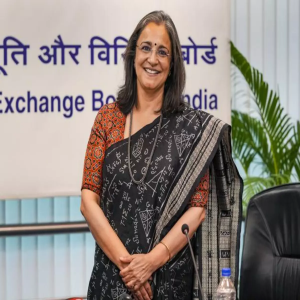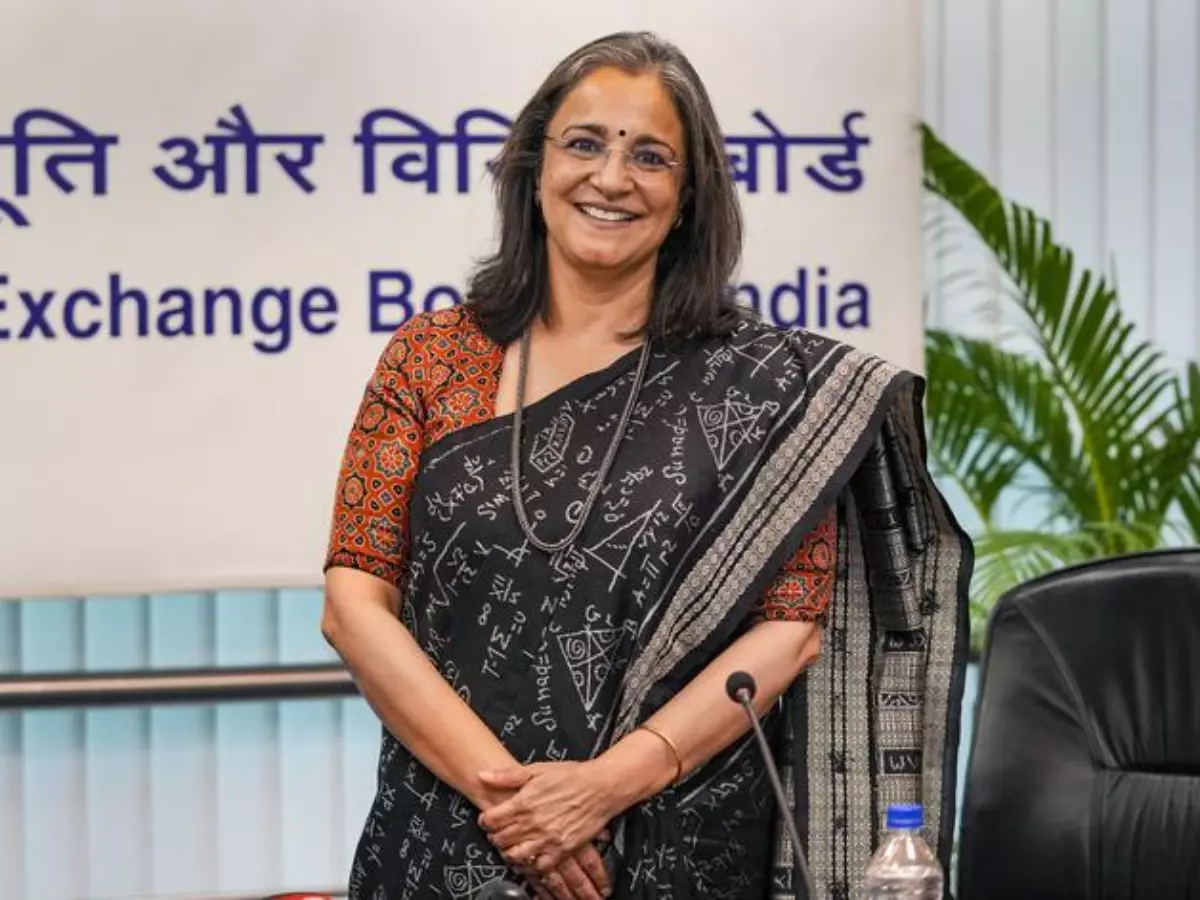
.png) Jaswant Kaur
Jaswant Kaur

The SEBI chief has come under the scanner again—twice in less than a month, with a fresh round of allegations, sending shockwaves through financial markets and raising integrity concerns about one of our most crucial regulatory bodies. The story began last year when Hindenburg, the US-based research organisation in forensic accounting, published a report in January 2023, accusing the Adani Group of stock manipulations and inflating the values of some stocks.
Based on extensive interviews with people who worked with the Adani Group and after reviewing thousands of documents and conducting site visits in almost half a dozen countries, the report revealed how Adani "amassed a net worth of 120 billion dollars, adding over 100 billion dollars in the past three years, largely through stock price appreciation in the group's seven key listed companies, which have spiked an average of 819 per cent during that period."
It also exposed several offshore shell companies that were formed without employees, addresses, phone numbers, or meaningful online presence. Allegedly, these companies were established under the direction of Vinod Adani (Gautam Adani's elder brother) or Adani's close associates for rotating transactions, holding shares in the Adani Group's listed companies, etc.
The report further demonstrated how the group tried to conceal the nature of these shell entities by creating various websites, displaying only stock images with no employees, and even listing similar "nonsensical services like consumption abroad and commercial presence." In fact, these shell companies were used for stock manipulation and money laundering through Adani's private companies onto the balance sheets of the listed entities, essentially to create the appearance of financially sound and healthy companies.
Despite denying the allegations, Adani Enterprises withdrew its Follow-on Public Offer (FPO) even after it was fully subscribed. The Adani Group certainly faced a massive blow as its market capitalisation plunged by 150 billion dollars. Taking cognisance of the report, the Supreme Court directed SEBI to investigate and submit its findings.
During the investigation, SEBI did not find much substance in the report. Instead, it issued a show-cause notice to Hindenburg Research, alleging that it had violated securities laws during its short-selling transactions. Calling the show-cause notice an "attempt to silence and intimidate those who expose corruption," Hindenburg, in its response, also mentioned the involvement of Kotak Mahindra Bank and brokerage firms established by Uday Kotak, which were responsible for managing funds during the short-selling against Gautam Adani.
"While SEBI seemingly tied itself in knots to claim jurisdiction over us, its notice conspicuously failed to name the party that has an actual tie to India: Kotak Bank, one of India's largest banks and brokerage firms founded by Uday Kotak, which created and oversaw the offshore fund structure used by our investor partner to bet against Adani," Hindenburg stated.
Last month, Hindenburg, in its latest report, alleged that SEBI Chairperson Madhabi Puri Buch and her husband Dhaval Buch's investments in a certain global offshore fund have layered connections to the Adani Group. Moreover, it reported that Buch used to inflate Adani Group stocks, which were under investigation for allegedly rigging stock prices.
These claims certainly raised eyebrows, as SEBI's investigation into Adani's case did not reveal any violations. Doubts were raised about how SEBI conducted its investigation, with demands for a court-monitored probe by the CBI or a Special Investigation Team. However, the Supreme Court rejected the plea, concluding that SEBI had conducted a "comprehensive investigation... no apparent regulatory failure can be attributed to SEBI based on the material before this Court. Therefore, there is prima facie no deliberate inaction or inadequacy in SEBI's investigation."
The fresh set of allegations certainly raises questions about the quality of SEBI's investigation, given the alleged conflict of interest the SEBI chief may have in the Adani Group.
Within another month, yet another set of allegations surfaced. It was claimed that the private consulting entity owned by SEBI Chair Madhabi Buch accepted payments from multiple listed companies regulated by SEBI during her time as a SEBI Whole-Time Member. The companies implicated include Mahindra & Mahindra, ICICI Bank, Dr Reddy's, and Pidilite. Additionally, it is alleged that during her tenure as a whole-time member, Buch received rental income of 2.16 crore rupees from "Carol Info Services Limited," a company affiliated with the Wockhardt Group, while SEBI was investigating the group for insider trading cases during 2023.
This has undoubtedly raised concerns about how affairs are being managed at SEBI. Over the last year and a half, SEBI's role as a regulator and watchdog has come under scrutiny. It has certainly shaken the confidence of the average retail investor, who invests in the market believing it operates with transparency and fairness and that they will receive their fair share of market growth.
At this juncture, it is important to revisit and recall the very purpose for which SEBI was established as an independent market regulator.
Although SEBI as an entity was formed in 1988, it gained prominence in the 1990s when the Harshad Mehta scam exposed loopholes in the entire financial and banking system. The stock market manipulation led to a massive securities scam worth billions of rupees. The government granted SEBI significant powers to regulate the capital market and ensure transparency in securities transactions.
Over the years, SEBI has issued guidelines, rules, and regulations to promote disclosures and take action against insider trading, all with the goal of safeguarding the interests of millions of investors, small and large, who seek to maximise returns on their investments. However, the allegations against the SEBI chief raise questions about the regulator's ability to uphold the very purpose for which it was created.
The statements issued by Madhabi Buch and her husband denying any conflict of interest, on the grounds that the chief provided adequate disclosures about the consulting firm from time to time, do not enhance their credibility. Mere disclosure does not ensure an independent and transparent investigation, especially when claims of stock market manipulation have been levelled against SEBI's leadership.
Had she been so diligent, she should have also disclosed these transactions before the apex court when the case for setting up an SIT was being heard. In other words, such disclosures, even if made, were merely lip service to the standards that SEBI has set for itself.
The government cannot afford to be a bystander in this crisis. As the authority responsible for appointing SEBI's leadership and overseeing its operations, it must step in and take decisive action to restore public faith in the regulator. The allegations must be met with a transparent, independent investigation. While it is essential to avoid premature conclusions, Buch should either step down or be asked to step aside to ensure an impartial investigation.
The allegations against the SEBI chief, whether proven or not, also present an opportunity for reform in how the market regulator operates. These concerns highlight the possibility that those with power can manipulate the market to suit their interests. It is crucial to reflect, introspect, find loopholes, and make amends as soon as possible so that no one can take the public interest for granted.